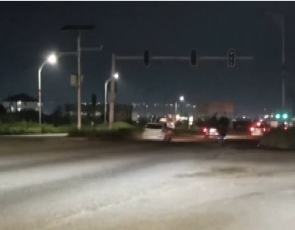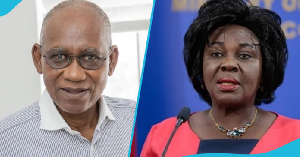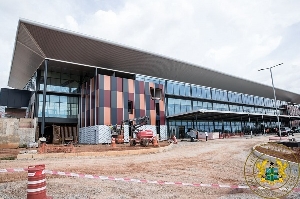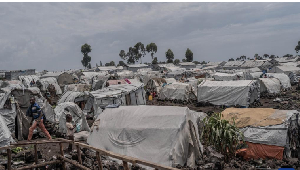Opinions of Thursday, 8 November 2012
Columnist: Mohammed Nurudeen Issahaq
Should Those Who Serve by the Pen Die by the Sword?
"By the edge of Kodero Forest in remote western Kenya, local hunters discovered the body of 31-year-old newspaper reporter Francis Nyaruri, decapitated and grotesquely disfigured, his hands tied behind his back to render him helpless. It was January 29, 2009, two weeks after the reporter had gone missing while on a trip to Kisii, about 30 kilometers from his home in Nyamira", goes a news item on the website of Committee to Protect Journalists (CPJ) written by Tom Rhodes and Clifford Derrick.
And in another episode, an online story from The Associated Press and ‘Haaretz’ Hebrew news website, dated April 18, 2008 says: “The Israel Defence Forces announced Sunday the launching of a formal investigation into the killing of a Reuters cameraman in Gaza, after a US-based human rights group accused troops of either firing recklessly or targeting the cameraman. Fadel Shana was killed while filming an IDF tank in Gaza on Wednesday, a day of heavy fighting”.
The spate of attacks and threats against the safety of journalists, as well as incidents affecting their ability to exercise free expression, has rapidly gained ground over time. Statistics gathered by the Committee to Protect Journalists testify to the staggering number of journalists and media workers killed while performing their professional duties. According to CPJ, 943 journalists have been killed worldwide since 1992, with 48 having lost their lives in the line of duty in 2012 so far.
Syria tops the list of countries classified as “Deadliest” countries in 2012 with 20 murdered journalists, followed by Somalia which accounts for ten. Next is Pakistan where five journalists have been killed and Brazil with three journalists murdered for doing their job. Since January this year, one journalist each has been reported killed in Lebanon, Indonesia, Cambodia, Bangladesh, Ecuador, Brazil, Nigeria, Tanzania, Bahrain and Thailand. Since the onset of the war in Iraq in 2003, more than 280 journalists have been killed there, according to a U.N Human Rights Commission report.
CPJ research further indicates that 57 journalists fled their countries of origin in the past year, with Somalia sending the greatest number into exile. Journalists also fled Ethiopia, Eritrea, and Rwanda – mostly to Kenya and Uganda. At least 26 journalists worldwide have disappeared while doing their work. Although some of them are feared dead, no bodies have been found, and they are therefore not classified as "Killed." Syria, Mexico, Ukraine, Iraq, Dem Rep of Congo, Algeria, Russia and Rwanda to mention but some.
The safety of journalists and the struggle against impunity are essential to preserve the fundamental right to freedom of expression guaranteed by Article 19 of the Universal Declaration of Human Rights. Without freedom of expression, and particularly freedom of the press, an informed and active citizenry, that essential critical mass required to make participation in the governance process a reality would be lacking. In an environment where journalists are not safe, citizens cannot access useful information. Hence, the benefits of democratic governance such as poverty reduction; gender equality and empowerment of women; the pursuit of justice and human rights; conservation of the environment, among other ideals, would be but a mirage.
Indeed journalists’ ability to carry out their professional duties without hindrance deserves to be protected, considering the sacrifices they make to serve the public interest. Their presence in conflict areas, for instance, is important as they convey vital information from those hot spots to the rest of the international community.
In times gone-by, the inscription “PRESS” on a vehicle or on a badge worn by anyone in a conflict zone was enough to insulate them against any form of attack or harassment wherever they went. The reality on the ground today is that in situations of war or armed conflict, journalists are increasingly being regarded as legitimate targets rather than impartial observers. Declarations such as “Those who live by the pen will die by the sword”, purported to have been issued by the Armed Islamic Group of Algeria [Onadipe and Lord, 2007], provide a vivid insight into the mindset of such lawless elements. Little wonder, therefore, that the number of journalists killed while performing their legitimate duties around the world continues to soar.
With the exception of a few instances, those journalists who have lost their lives were not caught in crossfire or got shot accidentally. Rather, the vast majority of them were murdered outright in cold blood – such as shot by a gunman escaping on a motorcycle, shot or stabbed to death near their home or office, or found dead after having been abducted and tortured.
The question that begs for explanation is: “Why media personnel?” There are no easy answers but some analysts view the trend as an act of desperation on the part of warring factions, while others interpret it as a demonstration of disdain/contempt for civilized order on the part of the perpetrators, as well as a challenge statement to the rest of the international community.
And just before anyone gets trapped in the erroneous belief that those tragedies happen only in faraway places, let it be recalled that similar instances of impunity have been recorded right here in Ghana in recent history. “THE body of Mr. Samuel Best Ennin, the enterprising and dynamic journalist whose life was snuffed out of him … by unknown assassins through gunshot, was at the weekend laid to rest at his hometown, Bribiwomanmu near Jakobu in the Amansie Central District of Ashanti”, a report on the website ModernGhana.com and dated 3rd April, 2007 announced.
News about the shocking murder of Samuel Ennin is still fresh on the minds of members of the inky fraternity and his immediate family. The slain Regional GJA chairman, who was also the News Editor of Ashh FM in Kumasi, was sitting over drinks with some colleagues at Liberal Spot, a drinking joint in Kumasi on the night of February 9, 2007, when two armed men stormed the place and shot him in the midsection and the neck.
To demonstrate the seriousness with which it viewed the late Samuel’s murder, the national executive of the GJA publicly pledged to give the police GH¢1,000 if they were able to apprehend the perpetrators of the crime, a promise the Association actually fulfilled later. In April 2007, the police paraded Sheriff Kabore and Kwame Ayew, in front of journalists in Kumasi and said they were the killers of Ennin. From then on, the wheels of justice appeared to grind too slowly and even to date, five years down the lane, the case remains inconclusive. The Police and the Attorney-General’s Department have all gone silent about it. Has the case been struck out? If so, on what grounds? And if not, what is being done as far as the prosecution of the alleged murderers is concerned? Or has Samuel Ennin’s case become another one of the numerous unresolved/abandoned ones of its kind that seem to have become the “Achilles’ heel” of the criminal justice system in the developing world!
In the vast majority of such cases the perpetrators of these crimes are never prosecuted, especially in the so-called Third World. Hence the problem of impunity arising from the failure to comprehensively investigate the murders of unarmed and defenceless journalists around the world and bring the perpetrators to justice, has become a global emergency and must begin to receive more attention from governments, human rights organisations and civil society as a whole.
In response to these disturbing incidents, a number of protocols have been passed by the United Nations Security Council and other concerned international agencies against the deliberate targeting of journalists, particularly in situations of armed conflict or war, UN Resolution 1738 being one of such protocols. Article 79 of the Geneva Convention on measures of protection for journalists says among other things that journalists engaged on professional missions in areas of armed conflict shall be considered as civilians. That they shall be protected as such under the Conventions provided that they do not undertake actions that will contravene/compromise their status as civilians.
As beneficiaries of the protection conferred by International Humanitarian Law on civilians, therefore, journalists and war correspondents are insulated against the effects of hostilities and against arbitrary conduct on the part of any party in a war even if they are taken captive. These conventions and protocols notwithstanding, the wanton killing of journalists has continued unabated and, interestingly, the day is yet to come when an individual or group of persons will be hauled before a court of law anywhere in the world for slaying a journalist with impunity.
This lack of prosecution is what emboldens criminal elements to continue to perpetrate more atrocities, knowing for sure that they can get away with it. Deliberately targeting and killing unarmed/defenceless journalists is an act of terrorism and the perpetrators must be dealt with as terrorists. In addition to preventive measures, therefore, the fight against impunity and the promotion of journalists’ safety require the adoption of tougher action against those found culpable. Such acts amount to war crimes and can be prevented only if the International War Crimes Tribunal exerts pressure on world leaders to ensure that perpetrators are smoked out from wherever they may be and brought to justice.
Furthermore, public awareness must be raised not only about these challenges but also the consequences that arise from a failure to act. Observed Barry James in his work on ‘Press Freedom’ (2000): “Every journalist killed or neutralized by terror is an observer less of the human condition. Every attack distorts reality by creating a climate of fear and self-censorship”.
Opinions











